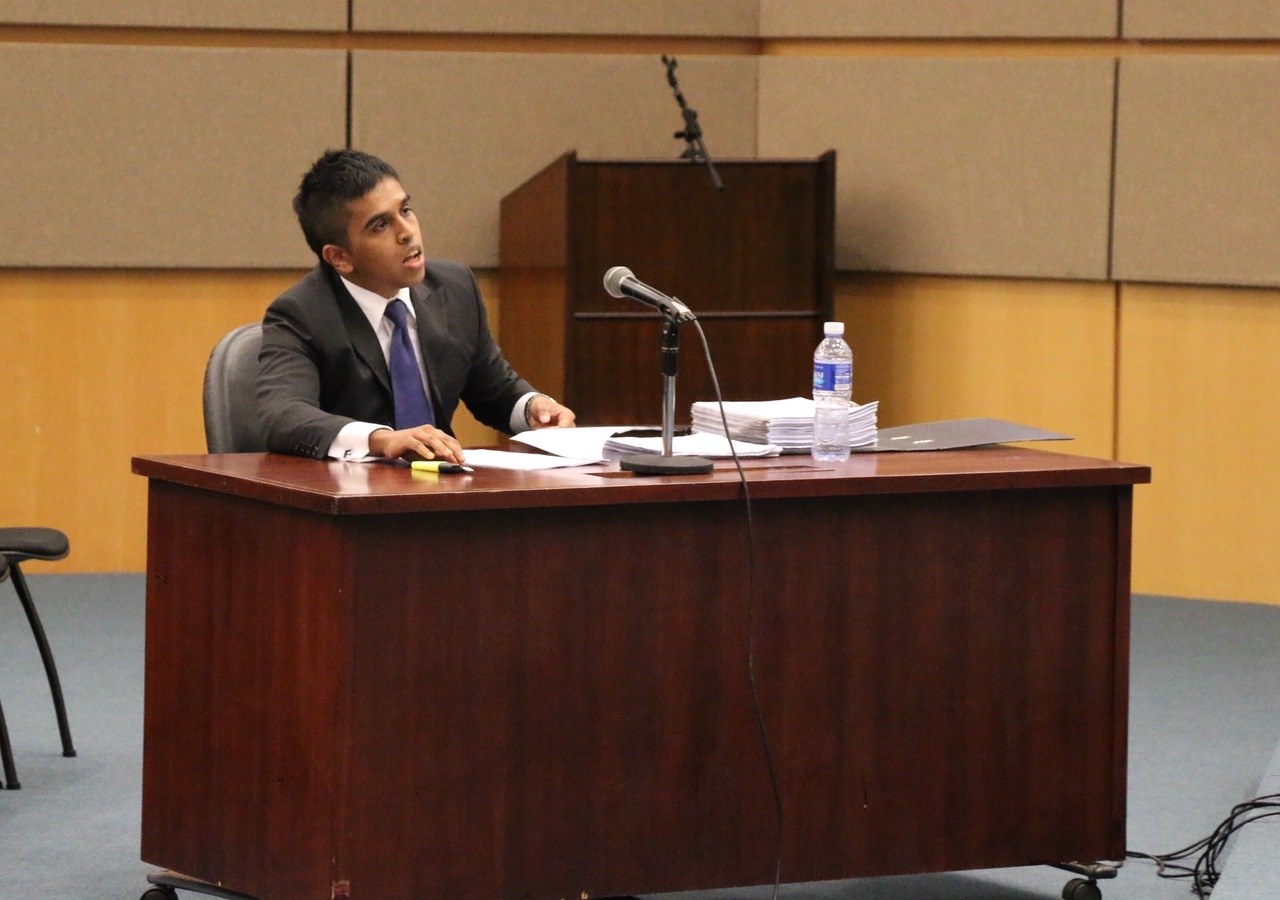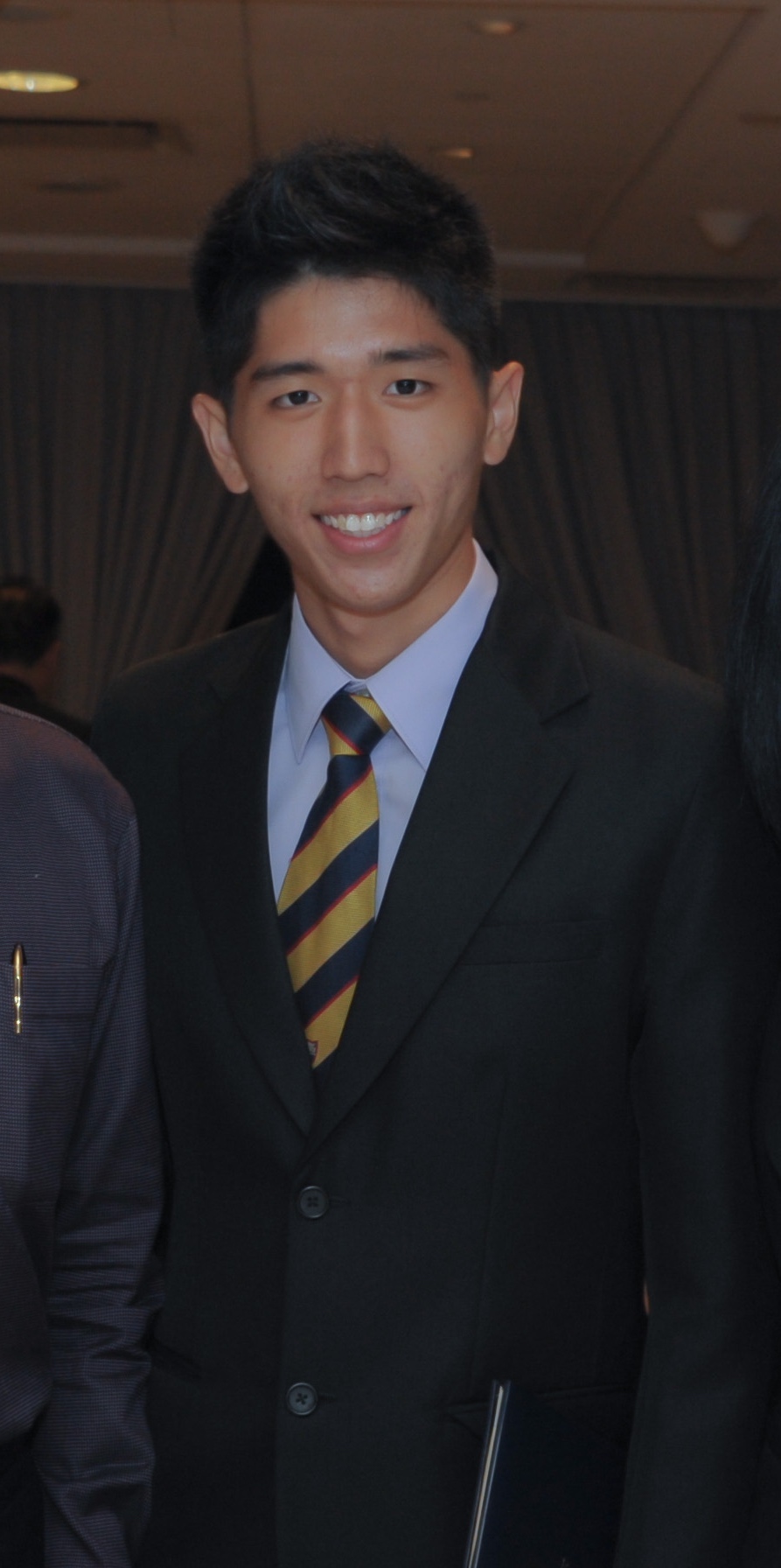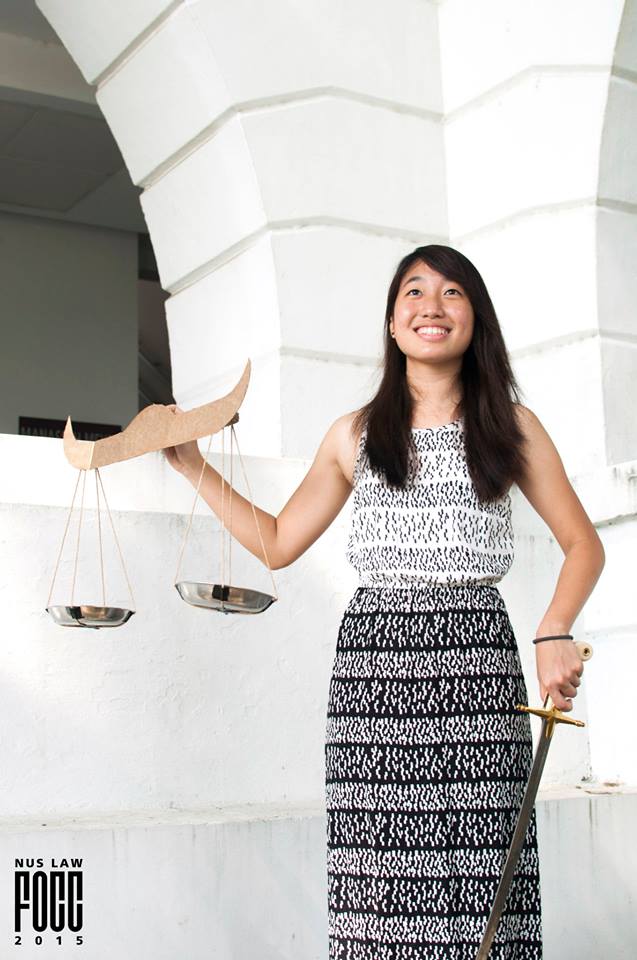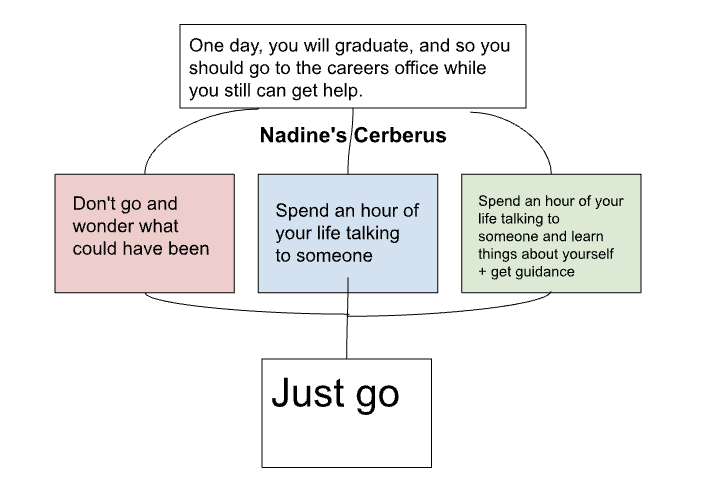The Law School Companion – The E-version
Perspectives – Dealing with the First Year
The Law School E-Companion features interviews with 4 different seniors. It contains snippets of advice and perspectives on the different pathways that can be taken in NUS Law. We hope that their advice would prove useful and instructive as you embark on your NUS Law journey.
HAIRUL HAKKIM (Y4)
Hairul is a Final Year undergraduate student who has obtained stellar academic results and consistently featured amongst the top of his cohort in NUS. He has appeared in the annual Dean’s List on three consecutive occasions and was one of the top two students in his Third Year of examinations. In addition, he has excelled in mooting over the years, having been crowned champion in two prestigious local moots (Mallal Moots and Wong Partnership International Commercial Arbitration Moot) as well as winning a few Best Oralist Mentions in international mooting competitions.
What advice would you give to the incoming freshies?
1. Don’t get burned out! Law school is a marathon and not a sprint. While there might be an irresistible temptation to study extremely hard in the first few weeks of every semester, remember to pace yourself. Otherwise, you might find yourself too exhausted by the time the exams are around the corner.
2. Treat all the modules that aim to develop legal skills seriously. A firm grasp of these skills will go a long way in coping well with your other law modules.
3. Form a study group with reliable friends and strategically divide the workload between each other. In my view, the demands of law school are so high such that it may seem difficult to thrive in this environment without the help of a study group.
4. Never leave things to the last minute and be consistent in your revision. While it might be possible to scrape through “O” and “A” levels with scrambling effort at the eleventh hour, it would be difficult to do likewise in law school.
5. Whenever you find yourself confronted with difficulties in fully comprehending any legal concepts, don’t be afraid to seek prompt clarification from your lecturers or tutors.
Is mooting for everybody? What did you learn from it and why do you think it is important?
Honestly, mooting is not as intimidating as it sounds. It is a myth that only charismatic speakers or people with prior debating experience excel in moots. No law student is born with the gift of mooting; mooting is a skill set which needs to be continuously fine-tuned and hence, success in moots requires a lot of effort and unwavering dedication. As long you are willing to continuously improve yourself through constructive criticism from your coaches and peers, you will most likely excel in moots.
Mooting trained me to think critically and craft better legal arguments. Crucially, mooting provided me with the rare opportunity to apply the theoretical knowledge acquired from law school in a practical setting. Through mooting, law school was a lot more enjoyable and purposeful since I could readily apply what I was learning. If you are considering a career in litigation, trying your hands at a few mooting competitions would provide a valuable insight into your potential career.
How do you balance mooting with your academics? We understand that you were away for three weeks in the middle of a semester for an international moot.
I had to travel overseas to represent NUS in the Willem C. Vis International Commercial Arbitration Moot, which unfortunately coincided with the school term. It was an extremely difficult period for me as I not only had to pile up on the workload in school, but I also had to miss a substantial number of lessons. While it seemed impossible for me to catch up when I returned, my study group and law tutors helped me tremendously throughout this difficult period. Without their kind understanding and able assistance, I am sure I would not have been able to do as well in my third year of examination.
What do you enjoy most about NUS Law?
It is hard for me to pinpoint one single thing. If I had to choose one, it would be the collegial experience of being part of NUS law, particularly the friends I have made here and the professors who are always willing to lend a helping hand to students who are in need.
If you could go through law school again, what would you have done differently?
I would probably have participated in more inter-faculty activities such as some of the CCAs offered in the main campus or stayed in a hall residence. This is primarily because law school is very isolated from the other faculties in NUS, which inhibits law students from forging valuable friendships with students from other diverse faculties and backgrounds.
CHUA CHENG AIK (Y3)
Cheng Aik is the epitome of an all-rounder, he works hard and plays hard. He is a Dean’s Lister, an executive member of the NUS Pro Bono group (University Court Friends), head of S2N for Rag, captain of pool (cue sports) and represents law school in basketball, volleyball and handball.
What advice would you give to the incoming freshies?
Just a couple of pointers:
-
Don’t shy away from challenges, especially “hard” modules or professors who mark more strictly on the bell curve (or so they say). Usually, these are the professors you learn the most from! In the same vein, don’t swap into classes just because your good friends are there!
-
Don’t study during the holidays, it doesn’t get you any further; just enjoy the break before you eventually start work.
-
Study smart: know what you have to put in the hours for and what you can simply breeze through. It will help to get study groups as well! Oh, and always practise past-year papers; it’s like TYS (duh).
-
Don’t be shy to participate in class; it’s always a win-win situation — either you impress the professor to secure class participation marks, or you clarify conceptual misunderstandings, even if you answer questions incorrectly.
-
Try to join at least one Inter-Faculty Game (IFG) or LawMed sport/activity; it’s really fun!
-
Last but not least, enjoy your ride in NUS Law!!!
How has your experience been with the Professors/Tutors in Law Faculty? What are they like?
I think NUS Law is one of the best faculties in the world. The professors are amongst the best in their fields. Personally, my experience with the professors has been no less than excellent. There might be rumours that certain professors might not be “good” at teaching, but perhaps the only reason behind these rumours is that these professors do not “spoon-feed” students as much — which might not necessarily be a bad thing!
Be that as it may, the professors’ insights into the law have always been enlightening. Many professors see the world in a certain way, perhaps due to their vast experience in the legal field or just their idiosyncrasies. Nevertheless, it is their different perspectives that breathe life into the substantive law. Personally, I enjoy classes where professors throw in a mixture of personal anecdotes and their individual opinions on the substantive law.
Take us through a typical school day for you.
I take the MRT to school and stroll through Botanic Gardens (now a UNESCO Heritage Site!). I would say that the stroll is one of the most important parts of the day, where I would mentally go through my commitments for the day. I’d then go for all my classes (yes, even lectures) with nothing less than a teh peng in hand.
Between classes, you will always find me in the lounge playing table tennis, foosball or pool. Otherwise, I’ll usually hang around with my friends in the Law Students’ International Relations Committee (LSIRC) room, go for training for basketball, handball or volleyball, or swim at CCAB. (It’s free and merely a stone’s throw from the library!) At the end of a school day, I would meet my friends or more often than not spend the rest of my time going through materials for class preparation. Depending on my mood, I would do that at home after dinner with my family or after I resign myself to my fate at the Summit.
What do you enjoy most about NUS Law?
The campus (not Summit — clearly, it’s not the peak of excellence), the faculty, and the people around! Personally, I enjoy my tutorial or seminar classes the most, and of course spending time with my batchmates in school, especially in the lounge or at IFG/LawMed trainings!
If you could go through the first 2 years of school again, what would you do differently?
Actually, I’m quite contented with how things turned out and I don’t have any regrets!
ELLIOT YEO (Y2)
Elliot is a second year law student at the National University of Singapore. During school term, he stays at College of Alice and Peter Tan, a residential college situated in Utown. His hobbies include hanging out with friends, swimming, playing football, performing music, and serving the community through volunteer work. He is also active in serving at his church. Moreover,Elliot enjoys planning activities for his juniors and has taken up a role in the Law Freshmen Orientation Central Committee 2015. After graduating, he aspires to serve the nation by working in the civil service.
How did you balance living in residence and your academic life?
First, allow me to share a bit about what life in residence has done for me. I think living in residence on campus is a wonderful opportunity to live independently and to grow in maturity. Staying at UTown gives me the space to explore my interests, while still allowing me to see my family and maintain close relations with them. It has also helped me be more involved in the student community at NUS, and get to know people from different faculties, with whom I would otherwise hardly associate, since the law campus at Bukit Timah is separate from the main campus at Kent Ridge. Living with people who come from different walks of life and have different ambitions has broadened my perspectives towards studies, community, careers, et cetera.
To address the question, I think law students face a tougher time balancing residential life and academic life (I say this with all due respect to the other faculties). This is due to the rigorous law school curriculum and, in particular, the 36-cred worth of modules in Year 1 Semester 2. As a result, I had to devote many hours to studying. Nevertheless, with regard to making friends and getting to know my community, I have definitely forged close friendships with some of my neighbours. In fact, some of my closest friends in university are from UTown.
Despite having to devote many hours to studying, I set aside about an hour or so everyday to talk to my neighbours, eat supper, and even play some games or sports. I believe that there is more to university life than just studying, taking exams, and graduating; rather, what we do and say will leave an imprint on the lives of other people. So for those living in residence, do make that effort to check on your friends and share your struggles with each other. Don’t give in to the temptation to ignore others and disappear into your room, especially when exams draw near!
As for events and activities offered at your residence, I would say that if you value these, then do spend some time drawing up a priority list and planning your law school and residential college/hall commitments. It is possible, but remember that no matter how efficient you are in time management, there will still be a trade-off at the end of the day.
Overall, I feel that my first year in residence was a very meaningful experience that contributed to a holistic university experience for me. I hope that it does the same for those of you staying in residence too!
What made you choose the societies/activities that you are currently involved in law school (i.e. the Pro Bono Group Varsity Christian Fellowship)?
The motivation for me when I joined these societies was to serve others both within the law school community and outside of it. I believe that having a group of friends who can support you and keep you grounded in school is very important. This is what the Varsity Christian Fellowship has done for me. At the same time, it gives me a platform to reach out and encourage others around me. We may not think much of it at first, but a kind word, a kind deed, or a meeting with someone to listen to his or her struggles, goes a long way in helping them. In law school, where stress levels are high and people begin to get more easily affected by the little things closer to exams, having an emotional support structure is very helpful.
I joined the Pro Bono Group because I wanted to gain exposure to the legal community outside of law school. I think helping out in Pro Bono initiatives opens our eyes to the needs of the low-income and less-educated people, such as foreign migrant workers, who cannot afford legal advice. In Year One, I volunteered for the University Court Friends (UCF) project at the Family Justice Courts, and it helped me see some of the family problems and broken relationships that pervade society.
Ultimately, many of these law societies help us see how the things we’ve learnt in classes apply to the real world. In my opinion, this is what the study of law is about — equipping us with the legal skills necessary to serve Singapore’s society.
We understand that you are the Vice-Chairperson of FOCC (Freshmen Orientation Central Committee). Was it difficult planning Orientation amidst the busyness of school?
I think that whichever role you take on in FOCC will no doubt require a sacrifice of time. As the Vice-Chairperson, my job was to assist the Chairperson in overseeing the preparations for Orientation events (Law Camp, Pro Bono, RAG, Matriculation Week) and ensuring that things like safety, budget, publicity, and administration were taken care of. In doing so, we also had to liaise with the Law Deanery and other important stakeholders. Juggling these commitments with studies was challenging.
However, earlier in the academic year, our Chairperson had already tailored the FOCC planning schedule to suit our academic calendar. This allowed me to focus on FOCC planning during the weeks I needed to, and to focus on studies during the more academic-intensive weeks. Despite there being a few crises that we needed to deal with, it wasn’t more than what we could manage.
Ultimately, I believe that good early-stage planning and efficient delegation of work to the sub-committees was the key to juggling FOCC with studies when the stress of the 36-credit second semester eventually arrived. I’m sure that many people involved in Freshmen Orientation had to face this struggle of striking a balance, and for that I’m deeply appreciative.
What advice can you give to juniors coping with the 36-credit second semester?
One important advice I would give is not to leave everything to Semester Two to study. The ungraded Semester One is manageable in my opinion, because it was designed to allow students a bedding-in process into law school life. Organise your study time and use Semester One to brush up on topics you are unfamiliar with. For example, establishing a good foundation in contract law topics such as “offer and acceptance” and “consideration” will put you in good stead to deal with the more difficult topics in Semester Two. Pacing yourself wisely will ensure a more reasonable workload during the 36-credit Second Semester, rather than cram a year’s worth of work into a month of revision and getting burnt out. Moreover, this will help you avoid compromising other things that you value, such as family time, friends, and extracurricular activities.
In addition, my other advice is to form study groups of your own where you can revise topics together and test your understanding of the subjects against your friends. Don’t feel intimidated or threatened if people all around you are studying. Instead, stay true and consistent to your study plan, have enough rest, and stay healthy by allocating some time during the week to exercise or play sports. It’s important to find your optimal level of studying.
Furthermore, don’t see your batchmates as competition for jobs/training contracts, but embrace them as friends. I believe that kind acts such as sharing your insights in class and teaching your friends outside of class will go a long way in helping both you and your friends consolidate your understanding of the law. From my experience, the discussions and moot practise sessions I’ve had with classmates and batchmates have always served to teach me a valuable thing or two that I had overlooked.
If you could go through first year all over again, what would you do differently?
I think I would be wiser in managing my studies and my relationships. I did not expect Semester Two to be as difficult and draining as it was for me. If given the chance, I would spread out my revision across the entire academic year, rather than cramming it into a month before the exams. Having a calmer perspective towards studies would no doubt reflect in my actions towards others as well. I was guilty of not looking out enough for some friends, and if I had the chance to re-live Year One, being intentional with commitments and relationships is something I would aim to improve on.
CHERYL LIM (Y2)
Cheryl is a second year law student at the Law faculty. In her first year of law school, she was part of the Freshmen Orientation Central Committee as well as becoming the NUS Law Pro Bono Group President. Apart from a love for pro bono work, Cheryl also represented the faculty in Tchoukball and Dodgeball for IFG. Beyond school life, Cheryl also serves actively in church as part of her church’s worship band. Her dream is to be engaged in human rights work in the future.
What advice would you give to the incoming freshies?
Always, always remember you have a choice in what you want to value in your university life. Sounds like common sense but it’s very important! You have a choice not to cave into the pressure of solely chasing good grades in law school. You’ll be sorely disappointed and unhappy if you do so — chasing good grades is tough, but more importantly, it’s beside the point. Remember to study very hard but also keep firm to all the other things and commitments in your life that are important to you.
How do you balance all your different commitments, such as being the president of the Pro Bono Group and a member of the Freshmen Orientation Camp Committee ?
I guess it’s about learning how to do things as efficiently as possible. There are only 24 hours in one day no matter how well you manage your time, and there are so many things to do. I try to find the most efficient way to complete each task by achieving a balance between quality and speed .
Also, I’ve learnt the importance of prioritizing different things at different periods of time since there are so many tasks to complete across the term. (It’s something that I’m still working on!)
Why should law students do pro bono?
Any law student who is interested in the law (I hope that’s most of us!) is necessarily interested in the concept of justice. What is a justice system in which members lack access to justice?
This lack of access could be due to ack of financial capabilities, lack of knowledge of the system, or simple in-built features in the system which prevent them from seeking effective remedies. It is both extremely meaningful and relevant, as law students and future lawyers, to be part of something that attempts to rectify all these obstacles to achieve a better justice system.
Also, doing pro bono work is the first opportunity you’ll get to see how relevant your study in school is to future practice. What we learn in school is meant to be applied, not just memorized; and by doing pro bono work, you will get to see that.
What kind of pro bono activities are there? How should freshmen select a pro bono activity from the many options out there?
There really are so many! It ranges from doing legal research on grey area issues like the rights of sex workers and migrant workers, to educating youths on legal issues, to volunteering at legal clinics, or interning at non-governmental organisations! These opportunities are provided either by the student-run Pro Bono Group, or the faculty Pro Bono Office.
It’s really hard to pick because each opportunity is gratifying in its own way — even seemingly boring projects can be extremely relevant when viewed from the perspective of our beneficiaries. But I guess you ought to pick a cause you’re most aligned with, or an area in which you feel that you can contribute the most in.
Did you have a good time during Inter-Faculty Games? Tell us why freshmen should join the Inter-Faculty Games.
I really did! I participated in Tchoukball and Dodgeball and had a lot of fun. In law school, sports has never been about winning and I guess that’s what makes it so fun for noobs like me since everyone is welcome to participate. It’s also an opportunity to bond with others in your level, as well as from other levels. (Calling all noobs to join the Dodgeball team this year, thanks!)
If you could go through first year all over again, what would you have done differently?
I would say that there’s a season for everything. I’ve always stressed the importance of valuing things outside of studying but two weeks before finals, I can finally and honestly say, is the season to just bury your head in your books. Suffering for two weeks won’t kill you. I wish I had done that.









